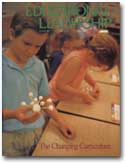At the School of Education where I teach, our mission is to prepare teachers to work in urban schools with a racially diverse student population. Our students, however, are predominantly Anglo, female, and monolingual. Many of them attended private, religiously affiliated elementary and secondary schools whose student populations were homogeneous. They live in predominantly white suburbs, and they come from primarily middle-class socioeconomic backgrounds.
As part of our effort to prepare teachers to teach in urban schools, we require our students to take a course entitled “Introduction to Teaching.” The course is intended to help the students learn to teach children who are racially different from themselves. As an African-American woman, I take teaching about racism and improving race relations very seriously. I know from my own research (Cross 1992) how teachers' values, beliefs, attitudes, and prejudices affect their teaching.
To help my students explore and understand the dynamics of urban schools and racism, I use a variety of methods including small groups, lectures, readings, class discussions, student journals, individual conferences, videotape analyses, group research projects, and field experiences in urban schools.
Discomfort About Race
When I started teaching this course last semester, students showed discomfort in talking about their experiences, feelings, and beliefs about racial differences. Some told me they were reluctant to share their thoughts with me because I am African-American. They were worried they might cross some invisible boundary and offend me. On one occasion, a student stumbled in her speech while presenting her group's analysis of racism in schools. Another student leaned over to her and said, “It's OK, you can say it.” In confirming she could say white in speaking about nonminority students, he also provided comfort for others in the class.
I work hard to maintain an open environment for discussing race relations, but have not always been successful. I vividly recall a male student walking out of the classroom. He could not bear to consider the possibility that the white middle class perpetuates racism. Although he returned after 15 minutes and was applauded by his classmates for doing so, he participated very little in the remainder of the class session.
As the semester went on, it became clear to me that a single course to understand an issue like racism and its connection to classroom practices was inadequate. The course methods and content were not turning my students into urban teachers who had commitments to improving race relations. I could tell from their journal entries and class discussions that the students were drawing conclusions from their field experiences that confirmed their prejudices and misconceptions about urban schools and children.
My students continually concluded that the children's behavior in school meant their parents did not care about them and were not involved in school, that urban children are violent and difficult to discipline, and that they are all poor and disinterested in school. This worried me as I contrasted these comments with those they made prior to the field experience. So many had said they wanted to become teachers because they “loved children.”
I began to think that it would not be possible to change beliefs, values, attitudes, and prejudices by merely requiring students to take a few courses. I began to wonder whether this semester of work to make my students more racially aware had actually resulted in their being less racially tolerant.
Professional Ambivalence
I become more discouraged when I realize that my peers in teacher education are ambivalent about our roles in preparing teachers with a commitment to improving race relations.
The first Association of Teacher Education Yearbook, Diversity and Teaching (Pasch et al. 1993), offers two views of preparing teachers for schools. These views are distinguished by whether or not a commitment to the special knowledge, skills, attitudes, and contextual demands of urban teaching is important for preparing teachers! Within two weeks of reading this, I heard a teacher educator from a small, rural university describe her new “program” to prepare teachers for urban schools. She described how her students, none of whom were minorities, were placed in urban schools for two hours per week and ended up loving the kids in “those” schools. My experience with my students and suspicion of this description caused me to question whether either coursework or field experience is an adequate way to prepare teachers who will be predisposed to improve race relations.
And simply putting academic content and field experience together is not enough. Even though I built in more time than I originally planned to conduct individual conferences about field experiences, my efforts still seemed inadequate.
These future teachers need ongoing professional development that is systematic and focused on problems of racism. They need additional means beyond college classes to examine their values, beliefs, and prejudices. Without this continued systematic examination, I fear we will be condemning another generation of urban children to being taught by teachers who often do not understand them.
I cannot think of education apart from its connection to improving race relations and thus do not see alternatives to teacher educators being very purposeful and dedicated in dealing with racism while preparing teachers. Our thoughts as teacher educators need to be transformed from thinking about what our programs should mean for future teachers to what they should mean for the students they will teach.
